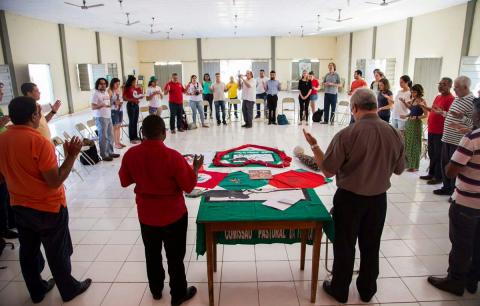
Dave Kane, who works for the Maryknoll Office for Global Concerns from his home in Brazil, was part of an international delegation traveling across the northeastern part of the country in September 2017 to document the social, economic, environmental and human rights impact of large-scale land acquisitions.
Read MOGC's final report of the fact-finding mission
A group of 30 human rights, development and rural experts are on a 10-day fact-finding mission in northeastern Brazil from September 4-14, 2017. Spurred on by existing evidence of human rights violations and environmental destruction, the international group will further document and analyze the structural impacts of large-scale acquisition and shed light on the scheming of land-based business in the region.
"The small have little right to the land," said Bishop Marcos A. Tavoni of the Diocese of Bom Jesus do Gurguéia in the state of Piauí, during a prayer with the delegation on September 6.
Land grabbing, a phenomenon that is becoming the norm
Since the 2008, the phenomenon of land grabbing has multiplied rapidly and profoundly the world over. With it, large-scale movement of capital by states and companies in the rural areas has increasingly been noticed behind the scenes of violent expropriation of traditional populations of their land, causing devastating environmental and social impacts. Brazil, covered in populous forests and savannah, has been a key target for investors of the land business, who have seen their profits skyrocket up to 400 percent to the expansion of commodity-producing agro-industries such as soy, sugar, corn, cotton, eucalyptus and meat.
MATOPIBA, a term that refers to the northeastern region of Brazil comprising the state of Tocantins and neighboring areas in the states of Maranhão, Piauí and Bahia, is a prime example of land expropriation. Deforestation and the consequent development of farms there cost very little to investors in border areas and generate exorbitant returns. Cases of land expropriation in the region have often involved large-scale public land acquisition from locally renowned land grabbers by international pension funds through Brazilian real estate companies. The latter, in reality, are transnational enterprises specifically created with this purpose.
The human cost of land acquisition
Peasants, indigenous peoples, descendants of runaway slaves and other forms of so-called traditional populations have been victims of massive and violent evictions since the beginning of the 21st century. These traditional communities have often been relegated to neighboring areas with scarce natural resources, which have proven insufficient for their survival and maintenance.
Those who have left permanently and migrated to the cities, are currently living in slums in the peripheries of great metropolises and trying to survive as part of the precarious workforce or illegally. Others that manage to set up homes on the nearby land remain, can only do so if they work in very risky conditions, almost mirroring slavery, in the same agribusiness farms that occupied their former lands.
Meanwhile, deforestation and the over-exploitation of land and other natural resources are leading to the destruction of biodiversity in the region.
The mission
During the fact-finding mission, participants will visit communities to document and analyze the structural impacts of land grabbing from a human rights perspective. The mission will also look into the obligations of the State of Brazil, as well as identify concrete extraterritorial human rights obligations of other States, where companies are part of the larger land business web.
The mission, organized by FIAN International, will count on the participation of: Action Aid International and Brazil, Aidenvironment; Cáritas Regional do Piauí; Comissão Pastoral da Terra Nacional and Piaui; Escola de Formação Paulo de Tarso (EFPT - PI); Federação dos Agricultores Familiares (FAF); Federação dos Trabalhadores Rurais na Agricultura (FETAG-PI); HEKS/EPER International Institute of Social Studies; La Via Campesina International and CLOC- La Via Campesina, Maryknoll, Paróquia de Santa Filomena, Instituto Comradio do Brasil; Rede Social de Justiça e Direitos Humanos; Sindicato dos Trabalhadores Rurais de Santa Filomena; Vara e Procuradoria Agrária - PI, PROGEIA (Santa Filomena), as well as FIAN International’s sections in Germany, Netherlands and Sweden.
Follow updates on social media via #BrazilLandGrab and #CaravanaMatopibaf.
Photo: Bishop Marcos A. Tavoni (right of table) prays with the members of the fact-finding mission on the first day of their 10-day investigation in northeastern Brazil. Photo by @ONGFase and posted on Twitter on September 6, 2017.
